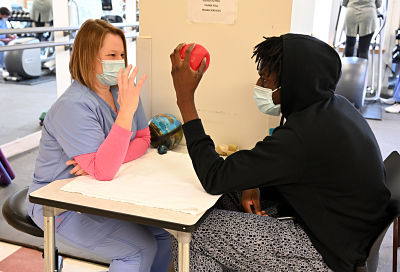
Picture of a man holding an orange ball while nurse shows him how to use it for therapy
Occupational Therapy program helps patients regain independence by completing daily living tasks
Our lives are defined by a series of meaningful daily occupations.
These occupational roles or everyday activities dictate who we are as individuals and ultimately shape our quality of life.
It's not until we're unable to perform these occupations that we begin to realize the true value of independence.
Illness and injury can happen to anyone at any time, hindering one's ability to complete the most basic tasks. In those instances, occupational therapy can be incorporated into the rehabilitation process to help patients achieve their goals whether it's getting out of bed, getting dressed or even picking up a golf club again.
"We get you back to doing the skills for the job of life," says Tamara Bigner, occupational therapist for Ashe Memorial's Hospital Rehabilitation Services. "It's all of those activities that make you have a good quality of life."
Bigner works with a variety of patients, ranging from elite high school athletes to elderly parents, many of which have suffered hand, wrist and elbow injuries. But occupational therapy isn't simply reserved for those recovering from orthopedic injury. Bigner also helps patients recover from illness and neurological issues stemming from strokes or Parkinson's disease, among others.
Bigner discovered occupational therapy early on after watching her friend Margaret, who has cerebral palsy, learn how to adapt to her environment and become independent doing daily tasks. Occupational therapy gave her more function and a better quality of life.
"With a little bit of adaptation people can be more independent," says Bigner. "Independence makes most people happier. When we lose our independence, we lose a lot of what makes us feel important."
Bigner earned her Master's in occupational therapy from LSU and spent four years doing inpatient rehabilitation in Louisiana. She spent the next 12 years as a traveling therapist for AMN Healthcare where she worked in skilled nursing, home health and acute care settings across Louisiana, California, Washington and North Carolina, among other states, providing both inpatient and outpatient therapy. As a traveling therapist, Bigner saw how occupational therapy helped a bilateral amputee return to the golf course, patients compete in wheelchair tennis and a motorcycle accident victim be able to wave his hand just to name a few.
Bigner joined the Ashe Memorial Hospital Rehabilitation Services Department a year ago. Since then, she has been helping Ashe County residents regain function and ultimately their independence.
In addition to providing therapy, Bigner also will make recommendations for equipment and home and safety modifications to ensure her patients are on the path back toward having a good quality of life. She also eventually plans to incorporate a room where patients, particularly inpatients in swing bed, can practice cooking and cleaning, so they know they can do it before they go home.
"I enjoy meeting new people and getting people back to an independency in life in whatever capacity it has to be," says Bigner. "That's the rewarding part of it when they realize "Hey, I can do this.' It's been fun."



